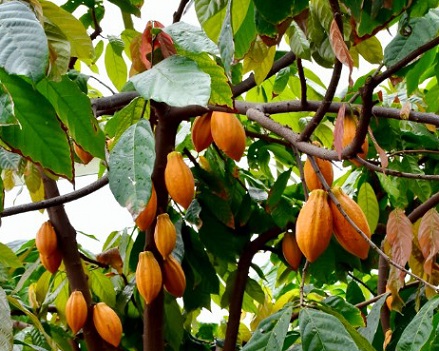BREAKING! Phytochemicals And Herbs: Malaysian Study Shows That Catechin From Cocoa Is A Potential Antiviral Against Dengue Virus!
Nikhil Prasad Fact checked by:Thailand Medical News Team Mar 20, 2024 1 year, 1 month, 5 days, 20 hours, 5 minutes ago
Phytochemicals And Herbs: Dengue fever, a viral infection transmitted by Aedes mosquitoes, has become a significant global health concern. With millions of cases reported annually, the absence of specific antiviral treatments poses a considerable challenge in managing the disease. However, a recent breakthrough study conducted by researchers at Universiti Malaysia Pahang Al Sultan Abdullah, Kuantan-Malaysia has shed light on the potential antiviral properties of a catechin – a phytochemical found in Theobroma cacao L., commonly known as cocoa. (The plant from where all chocolate products are derived from.)
 Malaysian Study Shows That Catechin From Theobroma cacao L.,
Malaysian Study Shows That Catechin From Theobroma cacao L.,
Is A Potential Antiviral Against Dengue Virus
Understanding Dengue Virus and Its Challenges
Dengue virus, belonging to the Flaviviridae family, comprises four serotypes (DENV1-4) and is primarily transmitted through the bite of infected Aedes mosquitoes. The virus causes a wide range of symptoms, from mild dengue fever to severe dengue hemorrhagic fever (DHF) and dengue shock syndrome (DSS). Currently, supportive therapy remains the mainstay of treatment, highlighting the urgent need for effective antiviral medications.
The Role of RNA-dependent RNA Polymerase (RdRp) in Dengue Virus Replication
One of the key targets for antiviral drug development against dengue virus is the RNA-dependent RNA polymerase (RdRp) enzyme. RdRp plays a crucial role in viral replication by catalyzing the synthesis of viral RNA, making it an attractive therapeutic target due to its essential function in the viral life cycle and its conservation across different dengue virus serotypes.
Computational Approaches to Drug Discovery
In the quest for novel antiviral agents, researchers are increasingly turning to computational methods to expedite the drug discovery process. Molecular docking, density functional theory (DFT) calculations, molecular dynamics (MD) simulations, and ADMET (absorption, distribution, metabolism, excretion, and toxicity) screening are among the computational tools utilized to assess the potential of natural compounds as drug candidates.
The Study: Evaluating Catechin from Cocoa Against Dengue Virus RdRp
The
Phytochemicals And Herbs study conducted by Universiti Malaysia Pahang focused on evaluating the inhibitory activity of 29 phenolic compounds extracted from cocoa, particularly catechin, against DENV3-NS5 RdRp through a series of computational analyses.
Molecular Docking Analysis
Molecular docking studies revealed that catechin exhibited high binding affinity with the active binding site of DENV3-NS5 RdRp, comparable to the reference compound panduratin A. The docking simulations provided insights into the potential interactions between catechin and key amino acid residues within the RdRp enzyme, essential for inhibiting viral replication.
Density Functional Theory (
DFT) Calculations
Further analysis using DFT calculations elucidated catechin's molecular properties, including its electronegativity, global softness, chemical reactivity, and intra-molecular charge transfer capabilities. These findings highlighted catechin's potential as a therapeutic candidate with favorable drug-like characteristics.
Molecular Dynamics (MD) Simulations
MD simulations were employed to assess the stability and dynamics of the catechin-DENV3-NS5 RdRp complex over a simulated time period. The simulations confirmed the stability of the ligand-protein complex, with catechin forming crucial hydrogen bonds and interactions at the binding site, crucial for inhibiting viral RNA synthesis.
ADMET Screening and Drug-Likeness Analysis
ADMET screening and drug-likeness analysis further validated catechin's potential as a lead compound for antiviral drug development. The compound demonstrated favorable pharmacokinetic properties, including water solubility, absorption in the gut, and safety profiles, essential for its therapeutic efficacy.
Molecular Properties and Interactions
Detailed analysis of catechin's molecular properties, such as its dipole moment, polarity, electron transfer potential, and reactivity, provided insights into its mechanism of action against RdRp. The compound's ability to form stable hydrogen bonds and specific interactions with key residues within the enzyme contributed to its inhibitory potency.
Binding Free Energy Calculations
MM-GBSA calculations were conducted to determine the binding free energies of the catechin-DENV3-NS5 RdRp complex, confirming the strong affinity of catechin for the target protein. Van der Waals forces, electrostatic interactions, and hydrophobic interactions were identified as major contributors to the binding process, highlighting the stability of the ligand-protein interaction.
Implications and Future Directions
The findings from this study have significant implications for antiviral drug development, particularly in the context of combating dengue virus infections. Catechin's potent inhibitory activity against RdRp, coupled with its favorable drug-like properties and safety profile, positions it as a promising candidate for further preclinical and clinical investigations.
Conclusion
In conclusion, the Malaysian study conducted underscores the potential of catechin from cocoa as a potent antiviral agent against dengue virus. The computational analyses provided valuable insights into catechin's molecular interactions, stability, and inhibitory mechanism against RdRp, highlighting its candidacy for future drug development efforts aimed at combating dengue infections. Further experimental validations and clinical trials are warranted to fully elucidate catechin's therapeutic potential and pave the way for effective antiviral treatments against dengue fever.
The study findings were published in the peer reviewed journal: PLOS One
https://journals.plos.org/plosone/article?id=10.1371/journal.pone.0299238
For the latest on
Herbs And Phytochemicals, keep on logging to Thailand Medical News.
